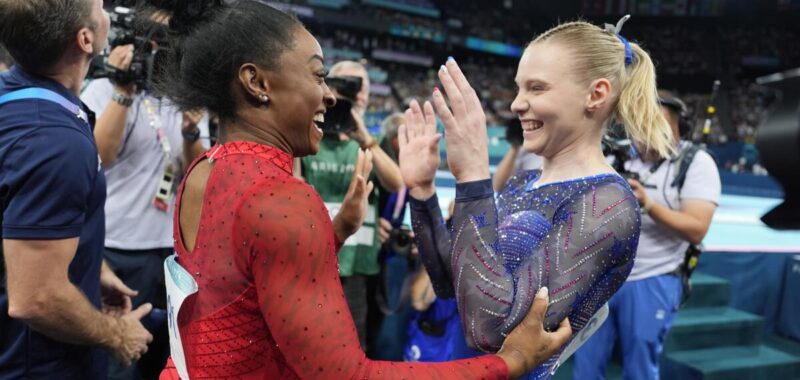PARIS — When the skill that used to be effortless left her questioning whether she could ever compete in gymnastics again, Simone Biles didn’t walk away from the sport.
She reinvented it.
Biles used her iconic Yurchenko double pike vault to claim her seventh Olympic gold medal on Saturday, blowing away the competition in the women’s vault final. The daring double-flipping vault had never been attempted before by a woman in competition before she completed it in the world championship last year.
The towering skill in which Biles is estimated to reach heights of 12 feet above the ground is one of the biggest signs that the 10-time Olympic medalist didn’t just return from the mental block that knocked her out of the Tokyo Games, but that she’s better.
“That’s been the best to recover from what she’s done,” Biles’ coach Laurent Landi said. “It’s amazing. Frankly, I didn’t think it was going to be possible because the trauma, I think, was deep and real. It’s great to see her out there and enjoying every moment and having fun.”
Biles said she and coaches were “a little traumatized” from the two-and-a-half twisting Amanar vault she performed in Tokyo when she got lost in the air during the team final. While she considered going back to it upon her comeback to the sport, it was Landi who planted the idea of perfecting the double pike instead. Even if Biles fell attempting it, costing a point in execution rating, it would be equivalent to the difference in the lower start value on the Amanar vault.
The vault’s level of difficulty — 6.4 points compared to the 5.6 value of the next highest vaults being done during Saturday’s competition — makes Biles almost impossible to beat on the event if she lands it cleanly. En route to a two-vault average score of 15.300, Biles scored 15.700 points on her eponymous vault. A perfect score on a single vault from any other competitor on Thursday could have only earned 15.600.
The top contender, the reigning Olympic vault champion Rebeca Andrade of Brazil, did not attempt a new skill that could have helped her challenge Biles, but executed two nearly flawless vaults to take silver with 14.966 points.
Jade Carey, who was expected to challenge for a vault medal in Tokyo but balked one of her attempts in the final, earned her redemption by winning a bronze medal. The 2021 Olympic floor champion overcame an illness that has been bothering her for more than a week to average 14.466 on her two vaults.
It’s the first time the United States has had two female gymnasts on the Olympic vault podium.
“This medal means everything to me,” Carey said. “I have been anticipating this day for a really long time and it was one of my biggest motivators to get back here and be in the vault final so to be able to prove myself and prove to myself that I can do two vaults in the final and to walk away with a medal is really special for me.”
Andrade, Brazil’s most decorated female gymnast, was considering a triple-twisting Yurchenko that could have tested Biles. She submitted the original skill that was worth six difficulty points and it would have cut the margin of difficulty between her and Biles down to four-10ths instead of a whole point. But she said she did not feel 100% confident so she opted for a more conservative two-and-a-half twist.
“Simone is from another world,” Andrade said, “but we always try to get better and evolve in the best way possible. To be able to watch her do her incredible gymnastics is an encouragement for everyone to do their best.”
Biles is still at the height of her powers during a third Olympic run. With three gold medals during these Games already, she still has two more medal opportunities remaining in the balance beam and floor finals on Monday. She joked she was “getting really old,” but said “never say never” when it comes to competing in the Los Angeles Olympics in 2028.
But one thing will be retired for sure: her Yurchenko double pike.
“I kind of nailed that one,” said Biles, who added a perfectly stuck vault during podium training to her three hit competition routines.
The skill is both physically and mentally taxing enough that she didn’t compete it during the team final and considered not using it during the all-around final. Ask even the men who have competed it, Landi said. It’s a difficult skill, and he’s also happy that she’ll be done with it.
“Four out of four,” Landi said, “what can I ask more?”

